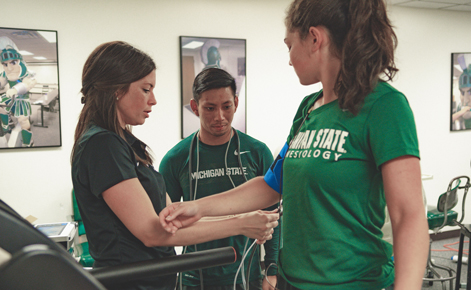
Can the time of day you exercise improve your blood pressure?
A study led by Michigan State University scholars will examine this and related questions with a $3 million grant from the National Institutes of Health (NIH).
The research will examine if exercising at specific times of day improves nocturnal blood pressure in older adults with hypertension. Nearly half of U.S. adults have hypertension or are taking medication for hypertension, according to the Centers for Disease Control and Prevention.
“Hypertension, or high blood pressure, is when vascular function decreases. Exercise has been documented to help increase function. Our study looks at if exercising at certain times of the day has a greater effect than other times,” said Katharine Currie, principal investigator and assistant professor in the MSU College of Education Department of Kinesiology. “Timing an intervention with the body’s internal rhythms, or chronotherapy, is an emerging and exciting field of study.”
If not treated, hypertension can damage arteries, decreasing blood flow and oxygen to the heart, which can lead to heart disease. Heart disease is the leading cause of death in the United States.
Nighttime Blood Pressure
“Blood pressure has a natural rhythm, changing over the course of the day,” said Jill Slade McMahon, associate professor in the MSU College of Osteopathic Medicine Department of Radiology and primary co-investigator. “We will be studying how nighttime blood pressure is impacted by exercise at different times of day as blood pressure dipping at night is an important component of cardiovascular health.”
Participants will use an ambulatory blood pressure monitor, worn throughout daily lives and activities, to assess 24-hour blood pressure patterns.
Can the time of day you exercise improve your blood pressure?
A study led by Michigan State University scholars will examine this and related questions with a $3 million grant from the National Institutes of Health (NIH).
The research will examine if exercising at specific times of day improves nocturnal blood pressure in older adults with hypertension. Nearly half of U.S. adults have hypertension or are taking medication for hypertension, according to the Centers for Disease Control and Prevention.
“Hypertension, or high blood pressure, is when vascular function decreases. Exercise has been documented to help increase function. Our study looks at if exercising at certain times of the day has a greater effect than other times,” said Katharine Currie, principal investigator and assistant professor in the MSU College of Education Department of Kinesiology. “Timing an intervention with the body’s internal rhythms, or chronotherapy, is an emerging and exciting field of study.”
If not treated, hypertension can damage arteries, decreasing blood flow and oxygen to the heart, which can lead to heart disease. Heart disease is the leading cause of death in the United States.
Nighttime Blood Pressure
“Blood pressure has a natural rhythm, changing over the course of the day,” said Jill Slade McMahon, associate professor in the MSU College of Osteopathic Medicine Department of Radiology and primary co-investigator. “We will be studying how nighttime blood pressure is impacted by exercise at different times of day as blood pressure dipping at night is an important component of cardiovascular health.”
Participants will use an ambulatory blood pressure monitor, worn throughout daily lives and activities, to assess 24-hour blood pressure patterns.
